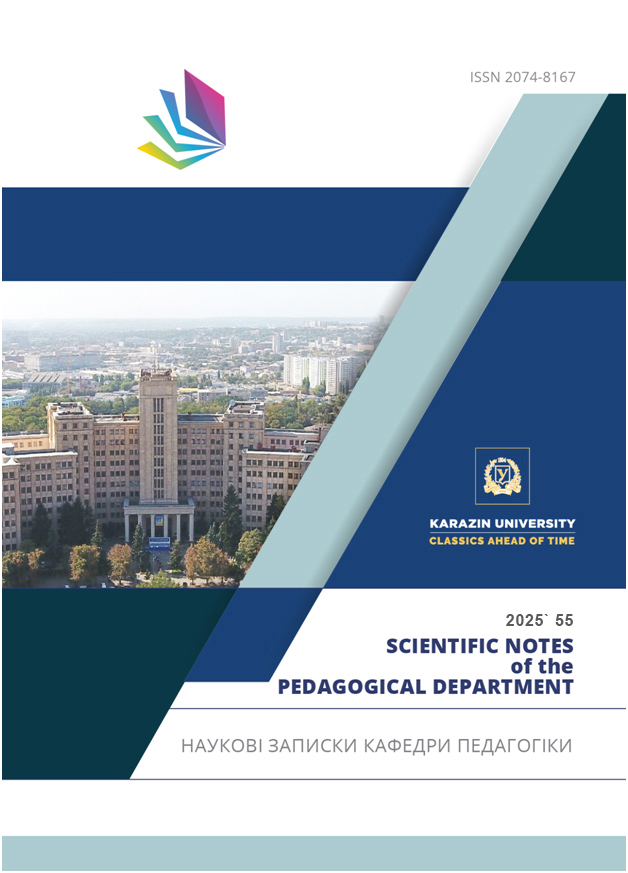Polish experience in developing one-year teacher certification programmes
Abstract
The article is devoted to analyzing the Polish experience in implementing one-year teacher certification programmes. The authors examine the organizational features of such programmes, their structure, content, and innovative approaches utilized in the learning process. At the core of the analysis is the programme of the School of Education of the Polish-American Freedom Foundation and the University of Warsaw, which combines theoretical training with intensive practice in partner schools.
Significant attention is paid to student selection methods, the structuring of the educational process and curriculum, content-technological support, and the specifics of teaching practice. The article elaborates on the principles underpinning the programmes, including the competency-based approach, the integration of practical experience, the application of active teaching methods, formative assessment, backward design concepts, and universal design in education. It also outlines the main courses that shape competencies of future teachers.
The innovative nature of the approach lies in combining full-time study with intensive teaching practice implemented in collaboration with over 30 schools in Warsaw and its suburbs. During their practice, students are involved in all aspects of a teacher’s work, including participation in pedagogical councils, conducting lessons, and consulting with mentors. The programme also fosters leadership and creative competencies, and its adaptability prepares teachers to address contemporary challenges.
The article proposes prospects for adapting the Polish experience to the conditions of Ukraine, which requires effective solutions in the field of teacher training in the context of the «New Ukrainian School» reform and post-war reconstruction.
Downloads
References
2. Yevtushenko, N. V. (2020). Polish experience in advanced training of teachers of natural and mathematical subjects and the possibilities of its application in Ukraine. Scientific journal of the National Pedagogical University named after M. P. Dragomanov. Series 5: Pedagogical Sciences: realities and prospects, 75(1), 76-79. https://doi.org/10.31392/NPUnc.series5.2020.75.16. [in Ukrainian]
3. Kuzminsky, A. I., Kuchay, O. V., & Bida, O. A. (2018). Using the Polish experience in training specialists in informatics in the system of pedagogical education of Ukraine. Information Technologies and Learning Tools, 68(6), 206-217. https://doi.org/10.33407/itlt.v68i6.2636. [in Ukrainian].
4. Monko, R. M. (2021). The system of training future teachers of engineering and computer science in the Republic of Poland [Abstract of the dissertation for the degree of Candidate of Pedagogical Sciences, Volodymyr Hnatyuk Ternopil National Pedagogical University]. Ternopil. [in Ukrainian].
5. Osadcha, K. P. (2018). Experience of tutoring and training tutors in Poland. Youth and Market, 8(163), 37-42. https://doi.org/10.24919/2308-4634.2018.132438. [in Ukrainian].
6. Cherevichny, G. S. (2024). Theoretical aspects of professional training of future history teachers in the Republic of Poland. Image of a modern teacher, 6(219), 72-75. https://doi.org/10.33272/2522-9729-2024-6(219)-72-75. [in Ukrainian].
7. Białek, K. (2020). Teachers’ development standards in the School of Education, Warsaw: A case study. In J.Madalińska-Michalak (Ed.), Studies on quality teachers and quality initial teacher education (pp. 89–104). Fundacja Rozwoju Systemu Edukacji. [in Polish].
8. Białek, K., & Czetwertyńska, G. (2023). Portfolio nauczycielskieskie: Praktyka Szkoły Edukacji PAFW i UW. Analizy i badania Szkoły Edukacji. https://szkolaedukacji.pl/wp-content/uploads/2023/11/Portfolio-nauczycielskie.pdf. [in Polish].
9. Brookfield, S. D. (2017). Becoming a critically reflective teacher. Jossey-Bass.
10. Eurydice. (2024). Initial education for teachers working in early childhood and school education. https://eurydice.eacea.ec.europa.eu/national-education-systems/poland/initial-education-teachers-working-earlychildhood-and-school
11. Liljedahl, P. (2016). Building thinking classrooms: Conditions for problem-solving. In P. Felmer, E. Pehkonen, & J. Kilpatrick (Eds.), Posing and solving mathematical problems: Research in mathematics education (pp. 307–318). Springer. https://doi.org/10.1007/978-3-319-28023-3_21
12. Myśłąca klasa. Szkoła Edukacji PAFW and UW. (n.d.). https://szkolaedukacji.pl/myslaca-klasa-2/. [in Polish].
13. Szkoła Edukacji PAFW and UW. (2022). Study program. https://szkolaedukacji.pl/wp-content/uploads/2022/07/syllabusy_2022-2023docx.pdf. [in Polish].
14. Szkoła Edukacji PAFW and UW. (2023). Ramowy class schedule. https://szkolaedukacji.pl/wp-content/uploads/2023/03/ramowy-rozklad-zajec.pdf. [in Polish].
15. Szkoła Edukacji PAFW and UW. (2024). Regulations of the «Szkoła Edukacji PAFW i UW» Program. https://szkolaedukacji.pl/wp-content/uploads/2024/04/regulamin-programu_2024_przyjety_8_02_2024.pdf. [in Polish].
16. Szkoła Edukacji PAFW and UW. (2024, September 16). Recruitment. https://szkolaedukacji.pl/rekrutacja/. [in Polish].
17. Szkoła Edukacji PAFW and UW. (2024). Zasady rekrutacji na studia podplomowe «Szkoła Edukacji PolskoAmerykańskiej Fundacji Wolności i Uniwersytetu Warszawskiego» in the academic year 2024/2025. https://szkolaedukacji.pl/wp-content/uploads/2024/04/zasady-rekrutacji-na-studia-podyplomowe_2024-2025_przyjety_Rada_SE_8_02_2024.pdf. [in Polish].
18. UNESCO. (2024, March 15). Global report on teachers: What you need to know. Building Peace through Education, Science and Culture, communication and information. https://www.unesco.org/en/articles/globalreport-teachers-what-you-need-know

